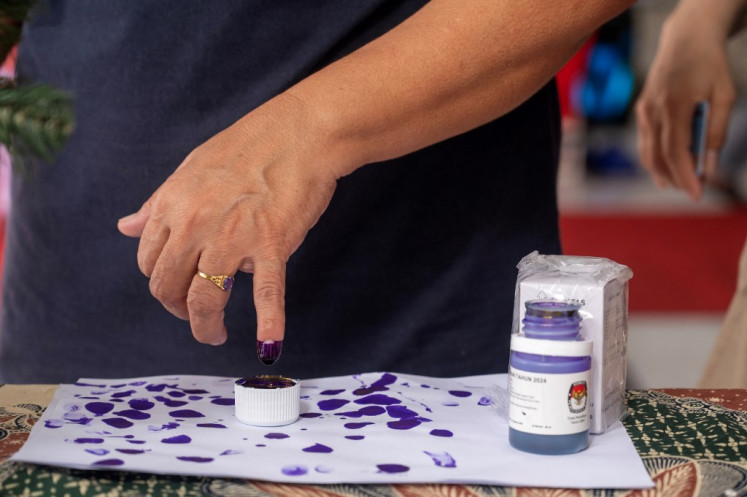Popular Reads
Top Results
Can't find what you're looking for?
View all search resultsPopular Reads
Top Results
Can't find what you're looking for?
View all search resultsNH Dini: Struggling against the odds
NH Dini, one of the country's most prolific authors, has temporarily quit writing
Change text size
Gift Premium Articles
to Anyone
NH Dini, one of the country's most prolific authors, has temporarily quit writing. A novel and two memoirs are left unfinished in her computer, which she now avoids for health reason.
NH DINI: JP/Ary Hermawan
"My vertigo is getting worse. I am not young anymore. My body's organs no longer (work) like they used to do.
"When it strikes me, it lasts longer and comes over and over again,"the 72-year-old author, known for her novels Pada Sebuah Kapal (On A Boat) and Namaku Hiroko (My Name is Hiroko) told The Jakarta Post in Jakarta on Wednesday.
The ailment requires her to leave Langen Werdasih nursing home, where she lives with other senior citizens in Ungaran area, to go to downtown Semarang, Central Java, to undergo acupuncture treatment at least twice a week.
But lately, the ailing author can only make the trip once a week because she cannot afford to take the extra trip.
She said that while the Chinese traditional treatment cost only Rp 60,000 (about US$5.50), the taxi fare to and from Semarang cost at least Rp 200,000, an amount of money that she humbly said she did not have.
Consequently, her health has gradually declined.
Born Nurhayati Sri Hardini Siti Nukatin in Semarang in 1936, NH Dini began her literary career in the 1970s, long before Ayu Utami and Dewi Lestari were dubbed by the media as the first generation of sastra wangi (fragrant literature) -- which symbolically refers to female authors -- as if the country had never had a female author before.
But, sadly, having produced dozens of novels and memoirs does not help her pay the taxi she badly needs to get her treatment.
The last royalty payment she received from Gramedia was only Rp 6 million.
"It is paid every six months," she said, adding that the amount had steadily declined while she still had to pay the "cruel" 15 percent tax.
The fact that an author as popular and prolific as she is can only generate Rp 6 million per semester will surely discourage anybody wishing to be an author in the country.
Despite the mushrooming publishing companies, the book industry is apparently not a lucrative business for authors.
Dini cannot hide her disappointment.
"So, I am quite popular and respected as a female author, but the money I get from writing does not suffice my needs," she exclaimed.
"Literature in Indonesia," she added, "is still a spiritual matter, not yet commercial."
But despite her grief, the author, whose works -- though written in a simple and conventional writing style -- resonate the idea of feminism and existentialism, refuses to succumb to her inauspicious situation.
To finance her healthcare in order to be able to write again, Dini decided to sell the Chinese decorative paintings she made during her spare time.
A former stewardess of Garuda Indonesia and a former wife of a French diplomat, Dini has traveled the world and lived in Europe and East Asia.
In Japan, she encountered Chinese traditional paintings and then became a self-taught drawer, a term she likes better than "painter".
Amid dominant contemporary paintings in today's art market, selling Chinese decorative paintings is not an easy task.
But Dini believes that apart from her big name in the literary scene, her paintings are serious works of art worth collecting by any art lover.
Unlike her books, which draw inspirations from society, her paintings are the results of her infatuation with nature.
"I am not like the old painter Ruliyati who went to the market and made sketches. I go to where I can see beautiful trees and pretty birds. The source (of inspiration) is nature," she said.
Yogyakarta's Gunungkidul is one of the inspiring sites of her Chinese-style paintings, which were done on a thin paper using Chinese ink. It requires a relatively formidable drawing technique, she said.
She has informed her colleagues that she now sells her paintings. The news spread quickly, but it got distorted when a television journalist and a mailing list incorrectly reported that she was going to undergo a kidney operation and urgently needed money.
"That journalist got it wrong. My friends called and sent me text messages to ask about my condition and they were confused to know that I was able to answer them," she said.
"If there is anyone who wants to help me", she said, "she has to know my real condition."
Asking for donation, in any case, is not her main objective. Through text messaging, three of her paintings have been sold at a price of between 3 to 5 million rupiah each, which is enough to help her cope with her illness for the next few months.
She did not intend to hold exhibition, which she said was too costly.
Two hotels in Semarang have actually offered her a space to exhibit her works, but they demand 30 percent of the revenue.
Many asked her why she did not ask her children for help.
"I did, many times, and I have grown embarrassed. I want to be independent, I cannot always ask them anytime I need money," she said.
Dini has two children, Marie-Claire Lintang and Pierre Louis Padang, from her marriage with her former husband, Yves Coffin. They all now live abroad.
Like her heroines in her novels, Dini said she refused to wait for the hands of other people.
She was taught by her working mother to be independent and that attitude has been consistently reflected not only in her writings, but also in her real life.
Her mother is as influential to her life as the French existentialist Albert Camus whose literary works Dini encountered while she was staying in France, and translated one of them, La Peste, into Indonesian.
Dini believes in free choice amid physical or cultural constraints. Thus, though stricken by vertigo and poverty, she is determined to finish her books.










